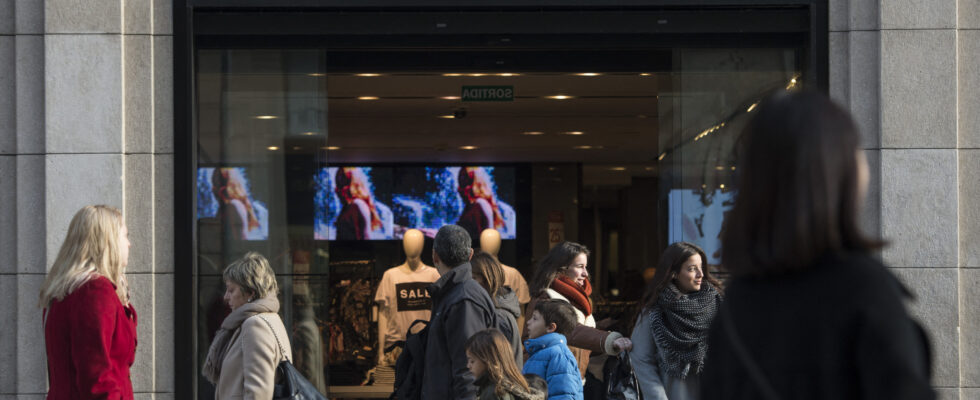(BFM Bourse) – The Spanish group has published the highest annual results in its history despite an unfavorable macroeconomic context for the ready-to-wear industry. The stock hits a new record.
While the ready-to-wear sector is going through an unprecedented crisis, the Spanish company Zara is in strong health. The results published by its parent company Inditex have once again reached historic records, whether in terms of sales, Ebitda (profit before interest charges, depreciation, taxes and amortization) and net profit.
Inditex, which includes the Pull&Bear, Bershka, Massimo Dutti and Stradivarius brands in addition to Zara and Zara Home, recorded revenue growth of 10.5% over one year in published data and 14.5% excluding currency effects, to post a record turnover of 35.95 billion euros for 2023-2024, the company’s financial year being slightly postponed to the end of January.
Inditex’s sales “experienced very satisfactory developments, both in stores and online” and were dynamic “in all geographic areas” where the group is present, the company argued.
Inditex has “once again managed to achieve a superb year of sales, despite an unfavorable macroeconomic environment”, appreciates Deutsche Bank.
Sales in physical stores increased by 7.9% while those online increased by 16% to reach 9.1 billion euros. These performances “clearly show the success of Inditex’s digitalization strategy, which has significantly improved productivity and customer experience,” notes Javier Molina, Market Analyst for eToro. The group also observed a 10% increase over one year in traffic to its websites, to 6.5 billion visits.
Record profits
A little further down in the accounts, Inditex displays an equally solid performance. The gross margin stood at 57.9%, up 77 basis points (0.77%) year-on-year. The group is reaping the benefits of controlling its costs, with operational expenses having increased by 10% over one year, less than turnover.
Ebitda (gross operating surplus) increased by 13.9% over one year to approach 10 billion euros at 9.9 billion euros. Ebit, or operating profit, increased by 23.4% to 6.8 billion euros, despite a charge of 231 million euros linked to the closure of its stores in Ukraine and Russia.
Net profit also reached a record level of 5.4 billion euros, surpassing by 30.3% its previous record of 2022, set at 4.13 billion euros.
Building on these historic performances, Inditex plans to be generous with its shareholders. The group plans to pay a dividend of 1.54 euros per share, an increase of 28% compared to that paid for 2022. It is broken down into an ordinary dividend of 1.04 euros per share and a dividend additional amount of 0.50 euros per share. This is also the highest return to shareholders in the history of Inditex. But this distribution is “slightly below” the Royal Bank of Canada’s estimate of 1.56 euros per security.
On the Madrid Stock Exchange, this publication is appreciated while disappointments are legion in this very competitive world of low-cost fashion. Inditex shares jumped 6.8% to their all-time highs, bringing their gains to 53% over one year. The Spanish group is to date the most powerful company on the Madrid Stock Exchange, with a capitalization of 136 billion euros, according to data from Companismarketcap.com.
A beautiful 2024 collection to come
Regarding its prospects, Inditex indicated that its “spring/summer” collections had been well received by its customers. The company also indicated that its sales over the period from February 1 to March 11 had increased by 11% compared to the same period of 2023, a performance described as “solid” by Royal Bank of Canada and which is higher than its expectations (+9%).
“Given feedback from most retailers of a relatively promotional environment, weak consumer outlook and spending, and unfavorable weather conditions, […] we consider that the figure of 11% is reasonable,” says Deutsche Bank.
For the current financial year, Inditex expects a negative currency effect of 1.5% on sales in 2024, which is in line with the financial intermediary’s forecasts. The company also confirmed that it expects a gross margin of between 57.4% and 58.4% compared to the 2023 financial year, where it registered at 57.9%.
“As usual, the forecasts are relatively limited,” laments Deutsche Bank, with Inditex expecting an increase of 5% between 2024 and 2026 in its gross commercial space, an increase which will be fueled by the opening or store expansion. Which is higher than the Royal Bank of Canada’s forecast of 3%.
The Spanish group plans to devote a generous envelope of 1.8 billion euros to investments dedicated to optimizing its commercial space and improving its online platforms. Inditex also plans to incur exceptional expenditure of 900 million euros per year to increase its logistics capacities over the next two years.
“The high sales densities (turnover generated for a given sales area, editor’s note) of Inditex have historically enabled it to obtain a margin greater than 10%”, a level that the Spanish group is able to “ maintain”, says RBC.
Sabrina Sadgui – ©2024 BFM Bourse
